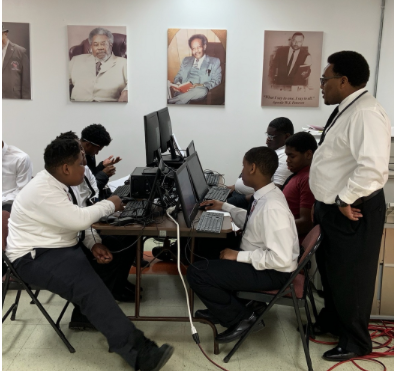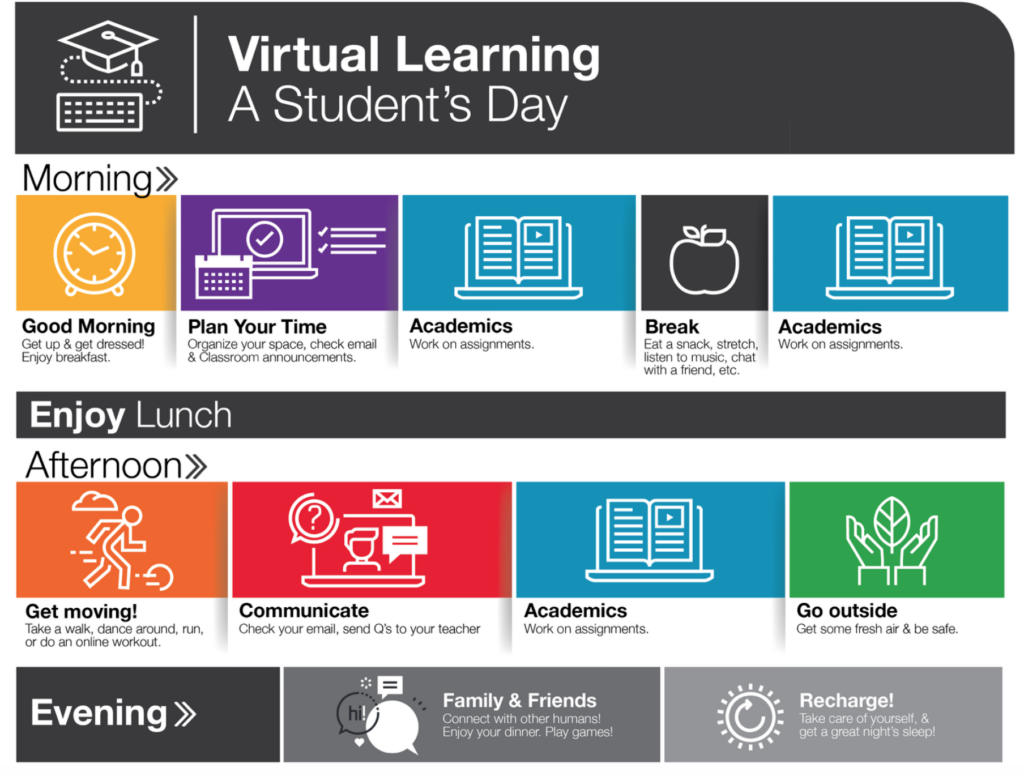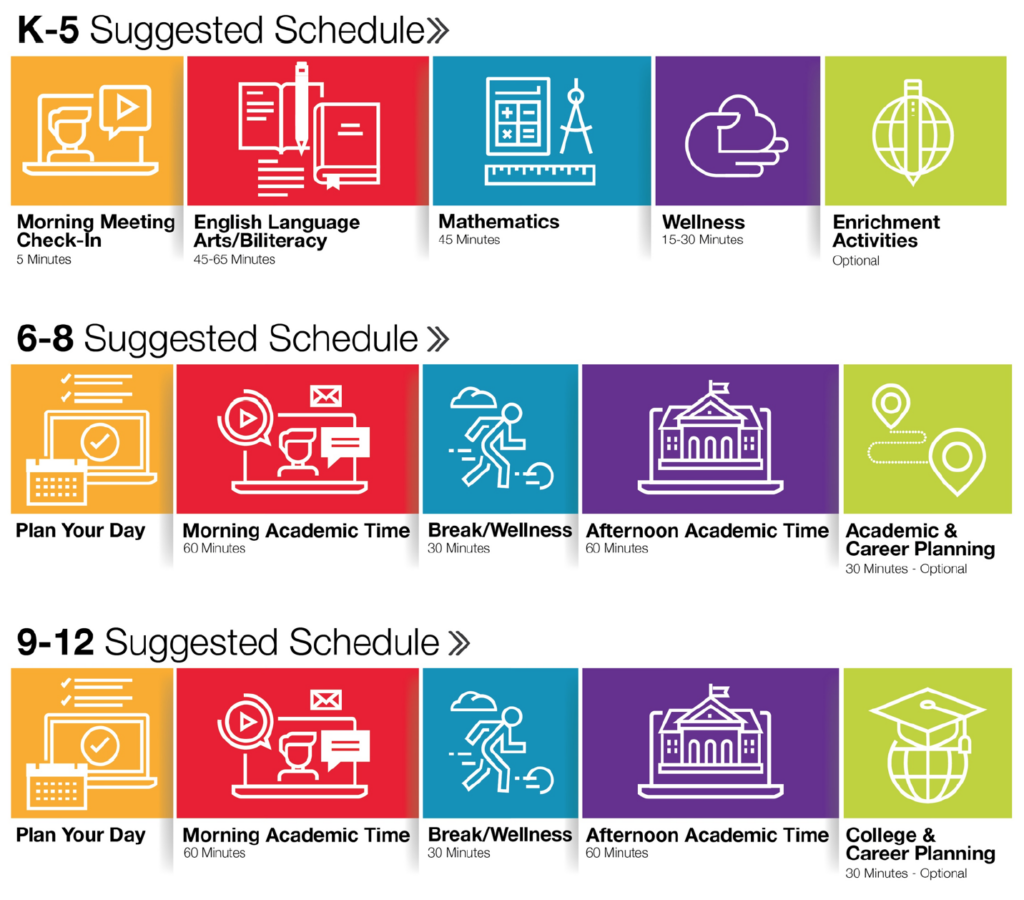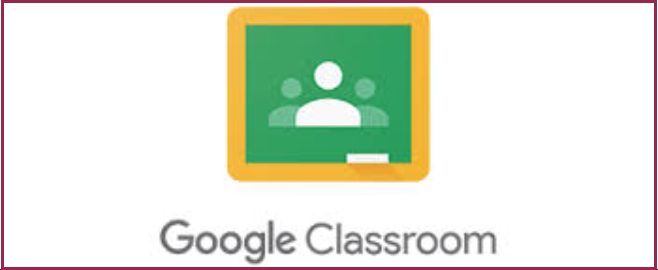The Pentecostal Christian Academy (PCA) supports Virtual Learning. Please see attached Announcement concerning Virtual Learning Fall 2020. PCA is prepared to support and engage our students to meet with confidence, imagination, and integrity the challenges of college and of life by fostering an environment where students and teachers have ready access to and a complete understanding of a vast array of instructional technology tools, devices, and related resources to accomplish any particular task
Our virtual learning vision model creates an environment where all students can confidently and responsibly engage in a robust curriculum supported with the most current tools of technology for teaching, learning, and assessment. PCA will provide guidance and support for the use of evolving pedagogical practices in the creation of authentic learning experiences that enable faculty and students to contribute productively to the virtual learning community
“Daily schedules have been developed to allow for seamless transitions to virtual learning”
Virtual Learning will be in effect for a number of weeks for the Fall 2020 due to COVID-19. As a result, students will not be allowed to attend classes on campus and will have to continue their learning experiences remotely. Daily schedules have been developed to allow for seamless transitions to virtual learning,

REMOTE LEARNING OBJECTIVES
- Be present for our students
- Keep our students engaged, connected, and supported
- Keep students’ learning on target with courses’ goals and objectives
- Communicate efficiently in order to support our students and their families
- Provide prompt feedback on students’ progress, work, and behaviors
- Provide flexibility, understanding, and grace to all constituencies
- Take care of each other and focus on health and well-being
PCA has developed a virtual learning program that builds upon what is great about learning in our building, and adjusts to the possibilities and limits of being online. In addition to a rigorous and engaging academic program, this includes considering the emotional and social well-being of our students, alongside strategies for building and developing relationships. Having plenty of opportunities to make connections and experience time together is of paramount importance to the PCA experience, whether online or in the classroom.
PCA created our new program grounded in best practices of virtual teaching. We also considered the feedback and ideas from education professionals, teachers, students, and parents from a number of sources to develop a program we believe is consistent with our mission of providing a quality Christian Education, founded upon the Word of God.
We look forward to welcoming students to start the year with PCA Virtual Learning Program. This program includes:
Improved Schedule
The schedule has been built to create a more predictable experience for our students whether in the building or virtual. In the Middle and High School, all classes will have a synchronous component in the morning, supported by Mastery Learning or asynchronous learning in the afternoon. In the Elementary School, there will be a full schedule with specials happening each day, with many of the periods being synchronous.
Balanced Approach
We believe that students need a balance of whole group and small group synchronous experiences, as well as some asynchronous experiences when learning virtually. Teachers will use synchronous time appropriately for the age of the student. We also believe in limiting screen time when possible. Teachers in the Elementary School will prepare packages to allow for hands-on activities and for additional work on paper. This will also happen for some subjects in the Middle and High School as well.
Centralized and Organized Platform
All students will receive a log-in for access to Abeka Learning. Additionally, all students will create an academic email via Google to use of PCA Learning Management System Google Education Suite. Additional information for these programs will follow.
Streamlined and Improved Use of Apps
PCA will use the Google Suite of Applications for an improved and streamlined virtual learning approach. We chose apps that allow students to create, interact with resources, collaborate with faculty and peers. Faculty and staff will spend considerable time with these apps as part of our faculty professional development time and PCA will continue to provide support and training for our teachers. Orientation of students and parents for the virtual learning program will take place the first week of school.
Powerful Teaching while Synchronous and Asynchronous
Faculty will use Google Meet for synchronous teaching. Resources are available to layout outline clear expectations for behavior while online, similar to expectations students experience in an in-person classroom. Teachers will also have training in different techniques to engage with students and allow for interaction and collaboration while on Google Meet.
Teachers will create and post asynchronous lessons that are also similarly engaging and allow for collaboration. These will be activities that move beyond the idea of homework and may well replicate that of being in a classroom; such as prerecorded and interactive lessons or group projects on a presentation, this will ensure masterly learning.
Effective Assessment and Regular Feedback
Teachers will develop appropriate methods of assessments for Virtual Learning and Abeka Workbook will coordinate with Live Stream Learning. Teachers will ensure that students understand the expectations for each assessment and may provide extra guidance. Likewise, we recognize the need to give feedback to students more regularly and in a timely manner and this will be reflected in the assessments students receive this year. Teachers will be available for individual conferencing with the students and will provide academic support.
Ways to Sustain Our Fellowship
All members of our school are committed to improving the ways we form connections while learning remotely. Each faculty member is going to be involved outside of the regular program with virtual clubs, homerooms, and meetings. The schedule allots time for such activities as well as for special events, meetings and assemblies
Support of Our Students and Their Wellbeing
Of utmost importance to us is the wellbeing of our students. Our activities will include social emotional learning for all students. Teachers will be cognizant of the amount of screen time required of students and ensure appropriate time for breaks. Teachers are prepared to spend time getting to know their classes at the beginning of the year and we will provide orientation to all students to acclimate them to the online experience. Classroom and peer relationships will be key to a successful experience.
Equity with Technology
We are making sure that both faculty and students have the necessary devices, connectivity, and accessories to participate fully in our program. Please complete this form to let us know what you need.

HOME ROOM
PCA will use the “HOME ROOM” structure to begin each school day. This approach will emphasize building relationships and making personal connections with students and families. Further the homeroom structure contributes to the learning environment by
1) scheduling more frequent virtual conferences with families to deepen connections and maintain effective communication,
2) scheduling and protecting time for homeroom meetings, and
3) emphasizing programming centered on Social-Emotional Learning (SEL) and Morning Devotionals.
Elementary School (K – 5)
Daily Schedule and the Classroom Experience:
With our initial return to school, all students will take part in virtual learning. The school day will begin at 8:00 AM and end at 2:30 PM. The daily and weekly classroom schedules will essentially replicate those that are in place during normal school operations. The schedules will be regular and predictable with all subjects being taught throughout the week. Time is also built in for lunch, story time, mystery learning and choice time. There will be a healthy balance between synchronous teaching and asynchronous activities as well as ample opportunity for individual and small group meeting times with teachers. We understand the challenge that having children studying online at home may place on some families.
Middle School (6 -8)
Daily Schedule:
A new daily schedule for this initial period of virtual learning is outlined below. We have designed a much simpler and more consistent schedule with ample time for academics, breaks from screens, and personal and community relationship-building. With multiple 60-minute periods per class per week, students will connect in real time with their teachers and peers. Each scheduled period will begin synchronously and then be used in dynamic ways by our faculty. Our schedule also provides students with moments of connection beyond academic classes to include, homeroom, assemblies, grade-level meetings, student clubs, and individual meetings with teachers. Additionally, we designed the schedule with attention to social-emotional learning and our commitment to equity and belonging work, resulting in balanced days and weeks to educate the whole student.
Student support and community:
One of the main advantages of this new schedule is the flexibility it provides to allow students to meet with faculty. Middle School students will need time for fellowship activities, including regular homeroom meetings with their teachers, office hours with their teachers and club meeting times, in addition to class meetings, Middle School meetings and assemblies. These times are crucially important opportunities to build community and connections and will help ensure that students feel connected with their teachers, and each other. Teachers will continue to closely monitor the academic progress and social well-being of students and serve as the first point of contact for parents. Additionally, students will continue to receive support and have access to our learning support team. The student support team will meet regularly to review and respond to student needs.
Class meeting/academic expectations:
Students are expected to be present for class for the entirety of the school day and each individual class period. Teachers will record attendance in Google Classroom and our normal attendance policies will be in effect. We ask that if your middle school student is expected to be absent from a specific period or the entire day, alert the homeroom teacher.
Homeroom or morning meeting will remain the start of the Middle School day and will begin daily at 8:00 am. At this time, Daily Devotional will take place followed by a review of the schedule for the day, and prioritize activities that focus on community, connection, current events, and most importantly, the social and emotional well-being of students. Additionally, on a weekly basis, students will also participate online for group activities including clubs, assemblies, grade level meetings, and small group social engagement.
High School (9 -12)
Daily Schedule:
A suggested high school daily schedule is outlined below. We have designed a much simpler and more consistent schedule with ample time for academics, breaks from screens, and personal and community relationship-building. With multiple 60-minute periods per class per week, students will connect in real time with their teachers and peers. Each scheduled period will begin synchronously and then be used in dynamic ways by our faculty. Our schedule also provides students with moments of connection beyond academic classes in assemblies, class meetings, student clubs, and individual meetings with teachers. Additionally, we designed the schedule with attention to social- emotional learning and our commitment to equity and belonging work, resulting in balanced days and weeks to educate the whole student.
Student support and community:
One of the main advantages of this new schedule is that it provides ample time for faculty office hours, in addition to other community times, such as Class Meetings, Student Council, and assemblies. These times are crucially important opportunities to build community and connections and will help ensure that students feel connected with their advisor, teachers, and each other. We will communicate with students regarding what opportunities are required of them, but students should expect to engage with this aspect of the program with the same intention as scheduled academic courses.
Class meeting/academic expectations:
Students are expected to be present for class for the entirety of the class period. Every class will meet synchronously at the time for which it is scheduled and students should plan on being present for all these meetings. Class meetings are 60 minutes and teachers will have discretion to use that time in ways that best accomplish the learning goals for that day. Teachers will record attendance in Google Classroom and our normal attendance policies will be in effect. Parents must communicate with the teacher via email or phone to excuse a student from class or an entire school day. Students can expect assignments and other substantive coursework will be assigned to be completed outside the synchronous class meeting times. Our schedule also allows for regular office hours and dedicated meetings every week, along with all of our customary community activities. These moments, among many others, will ensure students feel connected.
Daily Virtual Learning Protocol

Google Email
All students will need to create a dedicated Google Email Address for virtual. Students will to check their email accounts on a regular basis through out the day. This will be a main source of communication, so it is important for students to be reading emails and sending emails constantly throughout the day. Parents also need to check their emails from school.
Google Classroom
Students will be using Google classroom as a platform for students and teachers to exchange class information, turn in assignments, provide class resources, etc. Students should automatically see all their classes in Google Classroom if logged in with school email at the classroom url.
Abeka ProTeach
PCA has partnered with Abeka Learning to implement Abeka ProTeach School Streaming. Students are provided prerecorded online lessons corresponding with the Abeka curriculum lesson plans and student materials. Online lessons are taught by master teachers. The Abeka ProTeach Streaming system is a paid system based upon a minute by minute basis. It is important that students invest their time wisely to take full advantage of the online streaming and use each minute consumed. Students are expected to submit assigned coursework in a timely manner.

Digital Learning Etiquette
Students should be dressed appropriately because they will be seen by others.
Instruction: Students will have two sessions of online instruction for every class each week.
Independent Learning: Students will also be required to complete independent learning outside of online instruction for each class every week.
Assignments: Students will be required to complete assignments and submit them. Teachers will provide details on the specific assignments.
Office Hours: Office hours with teachers will be available at the end of each school day and all day Wednesday. Students can email questions to teachers or email a request to meet with the teacher for help during office hours. The teacher will reply to the email to answer the student’s questions or set a time to meet with the student.

Parents Help
Please ensure that your child is prepared for class and joins the live meetings with classroom teachers. Live classes help us to continue to connect with our students as much as possible.
Please email the teacher if your child is having trouble accessing Google Classroom and encourage students to check their emails.
Please help make your child’s learning environment as distraction-free as possible. They will need a study area/quiet place to take classes.
Please email your child’s teachers and our team if you have questions – we are in this together!
Please stay positive, give your student(s) plenty of time to exercise and have fun, and provide plenty of experiences that remind them that learning is a gift and is fun!






